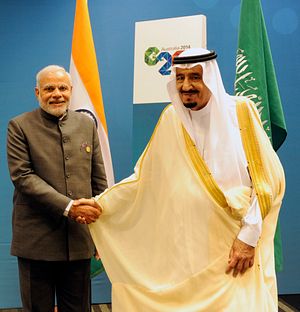Amid the turmoil of the Middle East, India has conventionally adhered to a policy of equivalence in dealing with Israel and neighboring Arab countries. Israel is a major defense and strategic partner for India while Arab state are leading trade partners, mainly fulfilling India’s energy needs and serving as a destination for India’s food exports. To maintain a friendly relationship with both sides, India prefers to avoid the Arab-Israeli conflict and advocates a dialogue-driven, peaceful, two-state solution.
Given India’s traditionally neutral Middle East strategy, Indian Prime Minister Narendra Modi’s decision to visit Israel in early July is a major departure from his predecessor’s policies. No Indian prime minister has ever visited Israel. When high-level Indian officials have visited, they have been sure to combine trips to both Israel and Palestine (as during the recent visit of President Pranab Mukherjee to the region). Modi previously visited Israel in 2006, during his tenure as chief minister of Gujarat, and he is also widely known for having a friendly stance toward Israel. This forthcoming visit will mark the 25th anniversary of India and Israel’s full diplomatic relationship, established during the Rao government in 1992.
Modi’s approach may anguish Arab partners, whose cooperation is equally important for India’s diplomatic and commercial interests. Perhaps to mitigate potential damage, India warmly welcomed the Palestinian president two months before Modi’s scheduled Israel visit, to send a message that these countries are equally important. Modi also has shown his enthusiasm for extending India’s relationship with the Arab world by visiting Qatar in 2016 and Saudi Arabia in 2015, in addition to inviting Abu Dhabi’s crown prince as the chief guest for this year’s Republic Day celebration.
Modi’s decision on a visit to Israel might be a sign of new political logic: namely, that India should expand the relationship with Israel by rejecting the old trend of balance diplomacy with Arab states. Israel, of course, has openly supported India’s stance on the Kashmir dispute several times at international forums, while most of the Arab countries have allied with Pakistan, nullifying India’s cause of combating cross-border terrorism. Such support may be linked with Israel’s interest in securing arms deal with India.
The arms trade with Israel has been increased manifold under the Modi government. As per the latest SIPRI release for 2016, India’s arms trade with Israel has increased 117 percent, from $276 million in 2015 to $599 million in 2016. India imports 48 percent of Israel’s total arms exports. Russia is still the largest exporter of arms to India, contributing 62 percent of total imports, but Israel has emerged as the second largest at 24 percent. Due to the burgeoning arms trade, India ranks among the world’s biggest arms importer (a label India is not happy with, according to its defense minister).
On the other side, India’s unilateral move toward Israel by dehyphenating it from Palestine could adversely affect overall commercial ties with the Arab world and with other Organization of Islamic Cooperation (OIC) countries. According to the Ministry of Commerce release for the financial year 2016-17, India’s volume of trade with Arab countries stands at $121 billion, which includes $50 billion in exports and and imports of $71 billion. That constitutes around 18.25 percent of India’s total trade while India’s trade with Israel, at $5 billion, accounts for less than one percent of total trade. Similarly, the bilateral investment volume with Arab countries is much higher than Israel. The Arab region is also a source of remittance inflows to India and provides the employment to Indian citizens. As of December 2016, there were around nine million non-resident Indians in Arab states, who contribute more than half (56 percent) of the total remittance inflow. As per 2015 estimates from the World Bank, the total remittances received by India from Arab countries amounted to $38 billion.
Intra-Arab political and sectarian differences have transformed the nature of their relationship with Israel. There’s a possibility that India’s title toward Israel might not have much impact with Arab partners, especially as the Qatar rift dominates regional politics. Still, India will have to weigh the potential downsides of such a policy. India, as a sovereign country, needs to design its foreign policy by assessing its own political and commercial benefits. Priorities need to be set up between defense and commercial relationships without bowing to any external pressure.
Shafeeq Rahman, Ph.D., is a Delhi-based researcher on socioeconomic databases. He blogs for the Huffington Post, DailyO, and many other national and international publications.































